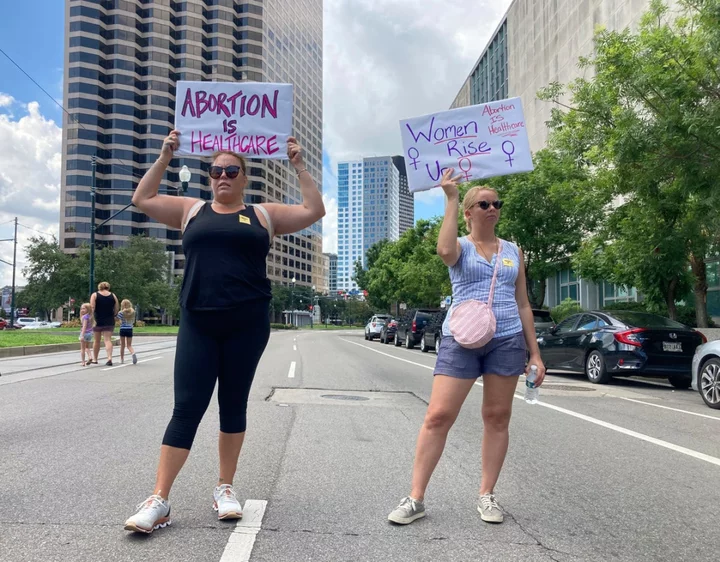
Anti-abortion laws harm patients facing dangerous and life-threatening complications, report finds
Healthcare providers caring for pregnant patients in the months after the US Supreme Court’s decision to strike down Roe v Wade have been unable to provide standard medical care in states where abortion is effectively outlawed, leading to delays and worsening and dangerous health outcomes for patients, according to an expansive new report. In the wake of the Supreme Court’s ruling last year, individual reports from patients and providers have shed some light on the wide range of harm facing pregnant women in states where access to abortion care is restricted or outright banned. But a first-of-its-kind report from the University of California San Francisco captures examples from across the country, documenting 50 cases in more than a dozen states that enacted abortion bans within the last 10 months, painting a “stark picture of how the fall of Roe is impacting healthcare in states that restrict abortion,” according to the report’s author Dr Daniel Grossman. “Banning abortion and tying providers’ hands impacts every aspect of care and will do so for years to come,” he said in a statement accompanying the report. “Pregnant people deserve better than regressive policies that put their health and lives at risk.” The report collected anonymised narratives from providers who observed complications facing their patients. The most common scenario involved preterm pre-labor rupture of membranes (PPRM), in which the amniotic membrane surrounding the fetus breaks. In several of the cases, patients developed a severe infection, including cases that put patients in hospital intensive care units. Patients in many cases were instead sent home and told to return to a hospital when labor started or when they experienced signs of an infection. In one case, a patient returned to a hospital’s intensive care unit two days after her water broke at roughly 16 to 18 weeks of pregnancy in a state where abortion is banned. “The anesthesiologist cries on the phone when discussing the case with me,” the physician wrote, according to the report. “If the patient needs to be intubated, no one thinks she will make it out of the [operating room].” The report notes that “miraculously” the patient survived. Following the termination of the pregnancy, the patient asked the doctor whether any of them broke the law. “She asks me: could she or I go to jail for this?” the doctor said, according to the report. “Or did this count as life-threatening yet?” Providers also described other cases where patients showed evidence of inevitable pregnancy loss, but their care teams had their “hands tied” under state laws. Health providers also submitted stories of patients experiencing ectopic pregnancies. Delays to treat one patient resulted in a ruptured ectopic pregnancy that required surgery to remove her fallopian tube. Another patient was denied an abortion for a Caesarean scar ectopic pregnancy, a life-threatening condition where a pregnancy implants in the scar of a prior Caesarean section. Other physicians reported the inability to treat patients with fetal anomalies and patients who faced delays receiving treatment for miscarriages. “Unfortunately, this report confirms that our fears about abortion bans are valid,” said Dr Chloe Zera, a maternal-fetal medicine specialist and associate professor at Harvard Medical School. “As someone who cares for patients who have high-risk pregnancies, I need to be able to provide care consistent with evidence-based guidelines,” she said in a statement accompanying the report. “This research underscores the completely preventable harm that is now happening to our patients because of barriers to abortion care.” The report also outlines the moral dilemmas facing physicians operating in states or treating patients from states that have outlawed the potentially life-saving care they previously provided. Some physicians said they were considering quitting or relocating, or noted the immense coordination required between health providers in multiple states to treat patients, and outlined the ways in which restrictive state laws have complicated other care unrelated to abortion. In one case, a physician refused to remove an intrauterine device for a patient who was between 10 and 12 weeks pregnant, despite the partially expelled IUD posing a risk for infection or miscarriage. “The doctor did not feel comfortable” removing the IUD, one physician wrote, according to the report. “The context provided was concern over the recent changes in law that create [the] possibility for felony charges for providers causing abortion in our state shortly after the Roe decision was overturned.” During a “heated exchange” among health providers, “the doctor [said] the patient had... been examined by the nurse practitioner, who was unable to visualize the IUD, and that ‘even if I could see it and it was easily removable, I wouldn’t remove it because of the law,’” according to the physician’s description in the report. “Abortion bans that block providers from offering standard medical care have the greatest impact in states like Texas that have some of the poorest indicators of maternal health,” according to Dr Kari White, lead investigator of the Texas Policy Evaluation Project at The University of Texas at Austin. “Pregnant people should be able to rely on their healthcare provider to provide the best possible care, regardless of where they live,” she said in a statement accompanying the report. More than a dozen states, mostly in the South, have effectively outlawed or severely restricted access to abortion care after the Supreme Court’s decision in Dobbs v Jackson Women’s Health Organization last June. Read More Alabama Republicans would charge abortion patients with murder under proposed legislation Louisiana Republicans refuse rape and incest exceptions to state’s sweeping anti-abortion law North Carolina governor vetoes 12-week abortion ban, launching Republican override showdown A Texas man sued his ex-wife’s friends for allegedly helping her with an abortion. Now they’re suing him Supreme Court preserves abortion drug approval as legal case plays out
2023-05-17 01:59

North Carolina governor vetoes 12-week abortion ban, launching Republican override showdown
In front of an exuberant crowd, North Carolina’s Democratic governor vetoed legislation Saturday that would have banned nearly all abortions in his state after 12 weeks of pregnancy. Hundreds of abortion-rights activists and voters watched on a plaza in the capital of Raleigh as Gov Roy Cooper affixed his veto stamp to the bill. The veto launches a major test for leaders of the GOP-controlled General Assembly to attempt to override Cooper’s veto after they recently gained veto-proof majorities in both chambers. The bill was the Republican response to last year’s US Supreme Court decision overturning Roe v Wade. "We’re going to have to kick it into an even higher gear when that veto stamp comes down,” Mr Cooper told the crowd. “If just one Republican in either the House or the Senate keeps a campaign promise to protect women’s reproductive health, we can stop this ban.” Andrea Long, a 42-year-old mother of three from Cary, said she was honored be part of an “electric” crowd on what she called a “historic day for freedom” in North Carolina. “I couldn’t stop crying tears joy seeing the governor hold up the veto stamp, but I know it’s an uphill battle to keep this momentum going,” Ms Long said. Mr Cooper, a strong abortion-rights supporter, had until Sunday night to act on the measure that tightens current state law, which bans most abortions after 20 weeks of pregnancy. Mr Cooper spent the week on the road talking to North Carolinians about the bill’s lesser-known impacts and urging them to apply pressure upon key Republican lawmakers who hesitated about further restrictions during campaigns for office last year. The legislation passed along party lines in the last week in the House and Senate. Republicans have pitched the measure as a middle-ground change to state abortion laws developed after months of private negotiations between House and Senate GOP members. It adds exceptions to the 12-week ban, extending the limit through 20 weeks for rape and incest and through 24 weeks for “life-limiting” fetal anomalies. But Mr Cooper has said repeatedly the details contained in the 47-page bill show that the measure isn’t a reasonable compromise and would instead greatly erode reproductive rights. He cites new obstacles for women to obtain abortions — such as requiring multiple in-person visits, additional paperwork to prove a patient has given their informed consent to an abortion and increased regulation of clinics providing the procedure. Mr Cooper and allies have said those changes in practice will shut down clinics that cannot afford major upgrades mandated by new licensing standards and make it nearly impossible for women who live in rural areas or work long hours to access abortion services. Compared to recent actions by Republican-controlled legislatures elsewhere, the broad prohibition after 12 weeks can be viewed as less onerous to those in other states where the procedure has been banned almost completely. But abortion-rights activists have argued that it’s more restrictive than meets the eye and will have far-reaching consequences. Since Roe was overturned, many patients traveling from more restrictive states have become dependent on North Carolina as a locale for abortions later in pregnancy. Republicans call the legislation pro-family and pro-child, pointing to at least $160m in spending contained within for maternal health services, foster and adoption care, contraceptive services and paid leave for teachers and state employees after the birth of a child. Mr Cooper has singled out four GOP legislators — three House members and one senator — whom he said made “campaign promises to protect women’s reproductive health.” Anti-abortion groups accused Cooper of trying to bully them. One of those House members is Rep Tricia Cotham of Mecklenburg County, who voted for the bill mere weeks after she switched from the Democratic Party to the GOP. The move gave Republicans a veto-proof supermajority if all of their legislators are present and voting. Ms Cotham has spoken out for abortion rights in the past and even earlier this year co-sponsored a bill to codify abortion protections into state law. Rep Ted Davis of Wilmington — another targeted legislator — was the only Republican absent from last week’s initial House vote. The Senate margin already became veto-proof after GOP gains last November. Mr Davis said last fall that he supported “what the law is in North Carolina right now,” which was a 20-week limit. Davis has declined to comment on the bill, but House Speaker Tim Moore said recently that Davis is a “yes” vote for an override. Read More Faith leaders speak out against ‘toxic’ Christian nationalist conference arriving at Trump’s Miami resort GOP boycott in Oregon threatens abortion, transgender bills and protesters' own political careers Louisiana Republicans refuse rape and incest exceptions to state’s sweeping anti-abortion law Ukraine war’s heaviest fight rages in east - follow live Charity boss speaks out over ‘traumatic’ encounter with royal aide
2023-05-14 00:45

Eurovision 2023: Five times the US wowed Eurovision
Viewers worldwide will be able to vote for the first time but the US's role in the contest goes way back.
2023-05-12 09:28

Louisiana Republicans refuse rape and incest exceptions to state’s sweeping anti-abortion law
Louisiana Republicans have refused to add exceptions for rape and incest to one of the strictest anti-abortion laws in the country after the US Supreme Court revoked a constitutional right to abortion access. The state’s anti-abortion Democratic Governor John Bel Edwards opposed the exclusion, but he signed the state’s anti-abortion law last year despite pleas from abortion rights advocates to veto the measure. This year, state Rep Delisha Boyd introduced a bill that would amend the law to add exceptions for pregnancies from rape or incest, but lawmakers on a state House committee voted down the proposal, effectively killing it for the remainder of the legislative session. On 10 May, the committee struck down the bill after hearing testimony from rape survivors and abortion rights advocates who shared their experience and urged lawmakers to support survivors. Lawmakers voted 10-5 on party lines to keep exemptions from rape or incest out of Louisiana’s anti-abortion law. Lawmakers also heard from anti-abortion activists and John Raymond, a former Survivor contestant and pastor accused of taping students’ mouths shut and hanging another student by his ankles. Mr Raymond, who has pleaded not guilty to the allegations, told the committee that women will “clamor to put old boyfriends behind bars in order to dispense with the inconvenience of giving birth” if the state allows rape survivors to access abortion care. In this year’s legislative session, lawmakers are considering a package of bills aimed at loosening the state’s near-total ban on legal abortion care, but most of the proposals have been shelved. During the committee hearing, Ms Boyd revealed that she was born after her mother was sexually assaulted when she was 15 years old. “My mother never recovered,” she said. “No one looked after my mother. No one looked out for me.” Republican state Rep Tony Bacala said he opposed the legislation by pointing to Ms Boyd, who was born from rape, as a good person. In a statement, the governor said he was “deeply disappointed” by the vote. “The committee’s decision to prevent this important bill from being debated by the full House is both unfortunate and contrary to the position of a vast majority of Louisianans, who support these exceptions,” he added. “I simply do not understand how we as a state can tell any victim that she must be forced by law to carry her rapist’s baby to term, regardless of the impact on her own physical or mental health, the wishes of her parents, or the medical judgment of her physician,” said the anti-abortion Democratic governor, who signed the law that bans nearly all abortions, without exceptions, last year, despite pleas from abortion rights advocates to veto the bill. “As I have said before, rape and incest exceptions protect crime victims,” he added. Roughly 3 million women in the US have experienced rape-related pregnancy during their lifetime, according to the US Centers for Disease Control and Prevention. Louisiana also had one of the highest maternal mortality rates in the nation, disproportionately impacting Black women, according to the state’s Department of Health. Louisiana is among more than a dozen states, mostly in the South, that have effectively outlawed or severely restricted access to abortion care in the wake of the Supreme Court’s decision last year to reverse the half-century precedent for abortion access affirmed by Roe v Wade. The state also is central to a closely watched case that could determine the future of a widely used abortion drug used in more than half of all abortions in the US. The legal case over the federal government’s approval of mifepristone will return to the Fifth Circuit Court of Appeals in New Orleans on 17 May, the next step in one of the biggest abortion rights cases after the fall of Roe. The Supreme Court’s decision on 21 April maintains the US Food and Drug Administration’s approval of the drug after a federal judge in Texas struck it down in a ruling that would have profound and potentially dangerous consequences for millions of Americans if allowed to go into effect. A three-judge panel at the federal appeals court in Louisiana will hear arguments in the case next week. Read More Alabama Republicans would charge abortion patients with murder under proposed legislation A Texas man sued his ex-wife’s friends for allegedly helping her with an abortion. Now they’re suing him McConnell opposes Alabama Republican's blockade of military nominees over Pentagon abortion policy
2023-05-12 07:21

Captain America and Black Panther rumoured for upcoming Marvel game
Rumour has it Captain America and Black Panther are to join forces in my Hennig's new WW2 game for Marvel.
2023-04-10 15:38

NBA 2K23 Music Trivia: Erick's Vinyl Answers
Here's a guide for all the answers to the music trivia questions in NBA 2K23 MyCareer.
2023-04-10 15:38
